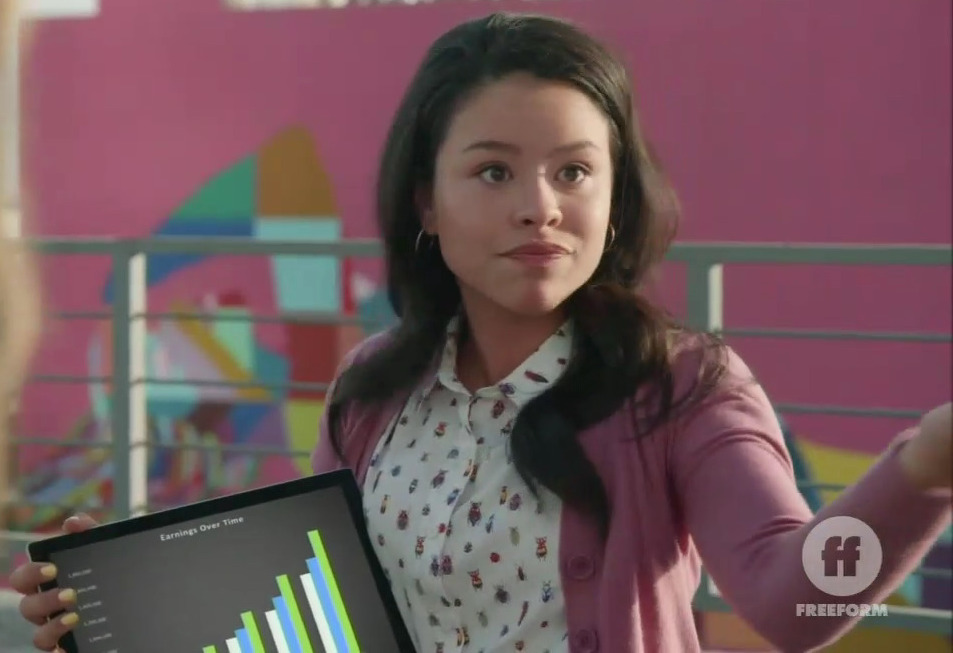 An issue frequently pushed by leftist feminists is that of the myth of gender-based pay inequity between men and women doing the same jobs in the same industries. The issue is promoted to a young adult audience on Freeform’s Good Trouble as Mariana struggles to adjust to her job in the high-tech industry. The episode airing March 19, titled "Less Than," even moves into playing the race card.
An issue frequently pushed by leftist feminists is that of the myth of gender-based pay inequity between men and women doing the same jobs in the same industries. The issue is promoted to a young adult audience on Freeform’s Good Trouble as Mariana struggles to adjust to her job in the high-tech industry. The episode airing March 19, titled "Less Than," even moves into playing the race card.
Mariana Adams Foster (Cierra Ramirez) is convinced that she is not being paid fairly in her new job as a software developer at a company called Speckulate. Her working team is all male and she is determined to expose the discrimination she feels as a woman in their working environment. Mariana forms a “Fight Club” for the women working at the company who are interested in ending alleged discrimination and pay inequity.
Her one male friend in the office, an Indian-American named Raj (Dhruv Uday Singh), helps her out by adding his salary information to a secret spreadsheet with all the other female employees of the Fight Club's salaries listed anonymously. After going over this initial data she has collected, Mariana thinks she has found another injustice. She thinks race plays into the situation as well, but the other women don’t want to go there #whitefeminism.
Raj: How’s the spreadsheet going?
Mariana: Oh. Well, we've got more women on board but yours is the only male salary that we have and we need more than one to prove that there's an actual gender pay gap. I did, however... find a pay gap among the women based on... race. I know it's touchy but... although we were able to disclose our salaries anonymously, I was able to discern a race pay gap between us. I was hired around the same time as another white female engineer, who shall remain nameless.
Claire: Everyone knows we were hired at the same time.
Mariana: As I said, not naming any names. But, it's just another example of the discriminatory culture at Speckulate and in tech in general. So I think that we should add a race column to the spreadsheet to point out that gender is not the only pay gap issue.
Casey: Personally, like... for me, I... always thought we were fighting for all women. Is that column necessary?
Mariana: Well, yeah, when... some of us are getting left behind.
Claire: 100%. But... shouldn't we address the gender pay gap first and then race? We don't want to confuse things.
Casey: I agree. One issue at a time.
The problem with Mariana’s columns and numbers on her spreadsheet is that she never explains how she comes up with her conclusions. For instance, did the white woman hired at the same time as Mariana come with more experience, an advanced degree, or a higher negotiated salary? We aren’t told. Any of those points could bring a higher salary for her than Mariana.
Mariana frets over the lack of cooperation from the other women on highlighting the racial pay gap until the end of the episode. She finally decides to call an impromptu meeting with the other women to make one last pitch over the race issue. She comes bearing personal figures to back up her argument that race should be included in its own column on the spreadsheet. Also, intersectionality!
Mariana: I called this impromptu meeting to readdress the racial pay gap.
Casey: I thought we decided one issue at a time.
Mariana: But they're not separate issues, they're intersectional. Look, we can't say that we're fighting for women when we're leaving those among us who are struggling the most behind. Which is women of color. Over time, the wage gap gets worse for women like me. And if you do get that raise, it's based on the initial lower salary. So, in 10 years, I will have lost around... $82,000, say compared to Claire. And in 20 years, I will have lost $164,000. True the average white guy engineer will have made roughly half a mill more than me by then, but... the average white woman will have left me behind as well. And that's not right.
Claire: Guess I never thought about it like that. I'm in.
Casey: Same.
Mariana: Great. Well, impromptu meeting adjourned.
Again, that scene shows Mariana quoting numbers from a tablet but she doesn’t fully justify her conclusions. She just rattles off numbers based on a tiny sample size. After the meeting breaks up, Casey reminds Mariana that they are the only two Latina women and if their race is added to the spreadsheet it would eliminate their anonymous status when going public. Mariana acknowledges that but presses on.
The issue of gender pay inequity has been written about on this site often. Hollywood loves to repeat myths in the propaganda foisted onto the viewing audiences. Whether it’s the character of Lois Lane or dialogue in a basic sitcom, the scripts continue to fight for a solution in search of a problem. The dopey comedies are not immune, either.
This is a trope that will live on for quite some time. Most often any pay inequity comes from a woman’s choice to work fewer hours to raise children or to be a caregiver to aging parents. The reason is often really just that simple, but victimhood is a powerful drug.





